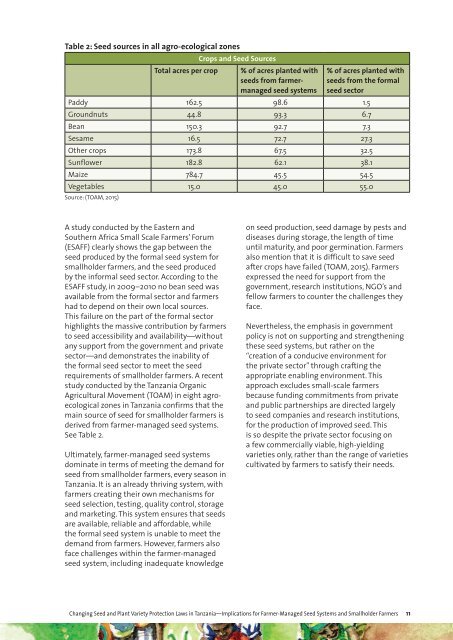Changing Seed and Plant Variety Protection Laws in Tanzania—
Tanzania-Seed-Law-2016
Tanzania-Seed-Law-2016
Create successful ePaper yourself
Turn your PDF publications into a flip-book with our unique Google optimized e-Paper software.
Table 2: <strong>Seed</strong> sources <strong>in</strong> all agro-ecological zones<br />
Crops <strong>and</strong> <strong>Seed</strong> Sources<br />
Total acres per crop % of acres planted with<br />
seeds from farmermanaged<br />
seed systems<br />
% of acres planted with<br />
seeds from the formal<br />
seed sector<br />
Paddy 162.5 98.6 1.5<br />
Groundnuts 44.8 93.3 6.7<br />
Bean 150.3 92.7 7.3<br />
Sesame 16.5 72.7 27.3<br />
Other crops 173.8 67.5 32.5<br />
Sunflower 182.8 62.1 38.1<br />
Maize 784.7 45.5 54.5<br />
Vegetables 15.0 45.0 55.0<br />
Source: (TOAM, 2015)<br />
A study conducted by the Eastern <strong>and</strong><br />
Southern Africa Small Scale Farmers’ Forum<br />
(ESAFF) clearly shows the gap between the<br />
seed produced by the formal seed system for<br />
smallholder farmers, <strong>and</strong> the seed produced<br />
by the <strong>in</strong>formal seed sector. Accord<strong>in</strong>g to the<br />
ESAFF study, <strong>in</strong> 2009–2010 no bean seed was<br />
available from the formal sector <strong>and</strong> farmers<br />
had to depend on their own local sources.<br />
This failure on the part of the formal sector<br />
highlights the massive contribution by farmers<br />
to seed accessibility <strong>and</strong> availability—without<br />
any support from the government <strong>and</strong> private<br />
sector—<strong>and</strong> demonstrates the <strong>in</strong>ability of<br />
the formal seed sector to meet the seed<br />
requirements of smallholder farmers. A recent<br />
study conducted by the Tanzania Organic<br />
Agricultural Movement (TOAM) <strong>in</strong> eight agroecological<br />
zones <strong>in</strong> Tanzania confirms that the<br />
ma<strong>in</strong> source of seed for smallholder farmers is<br />
derived from farmer-managed seed systems.<br />
See Table 2.<br />
Ultimately, farmer-managed seed systems<br />
dom<strong>in</strong>ate <strong>in</strong> terms of meet<strong>in</strong>g the dem<strong>and</strong> for<br />
seed from smallholder farmers, every season <strong>in</strong><br />
Tanzania. It is an already thriv<strong>in</strong>g system, with<br />
farmers creat<strong>in</strong>g their own mechanisms for<br />
seed selection, test<strong>in</strong>g, quality control, storage<br />
<strong>and</strong> market<strong>in</strong>g. This system ensures that seeds<br />
are available, reliable <strong>and</strong> affordable, while<br />
the formal seed system is unable to meet the<br />
dem<strong>and</strong> from farmers. However, farmers also<br />
face challenges with<strong>in</strong> the farmer-managed<br />
seed system, <strong>in</strong>clud<strong>in</strong>g <strong>in</strong>adequate knowledge<br />
on seed production, seed damage by pests <strong>and</strong><br />
diseases dur<strong>in</strong>g storage, the length of time<br />
until maturity, <strong>and</strong> poor germ<strong>in</strong>ation. Farmers<br />
also mention that it is difficult to save seed<br />
after crops have failed (TOAM, 2015). Farmers<br />
expressed the need for support from the<br />
government, research <strong>in</strong>stitutions, NGO’s <strong>and</strong><br />
fellow farmers to counter the challenges they<br />
face.<br />
Nevertheless, the emphasis <strong>in</strong> government<br />
policy is not on support<strong>in</strong>g <strong>and</strong> strengthen<strong>in</strong>g<br />
these seed systems, but rather on the<br />
“creation of a conducive environment for<br />
the private sector” through craft<strong>in</strong>g the<br />
appropriate enabl<strong>in</strong>g environment. This<br />
approach excludes small-scale farmers<br />
because fund<strong>in</strong>g commitments from private<br />
<strong>and</strong> public partnerships are directed largely<br />
to seed companies <strong>and</strong> research <strong>in</strong>stitutions,<br />
for the production of improved seed. This<br />
is so despite the private sector focus<strong>in</strong>g on<br />
a few commercially viable, high-yield<strong>in</strong>g<br />
varieties only, rather than the range of varieties<br />
cultivated by farmers to satisfy their needs.<br />
<strong>Chang<strong>in</strong>g</strong> <strong>Seed</strong> <strong>and</strong> <strong>Plant</strong> <strong>Variety</strong> <strong>Protection</strong> <strong>Laws</strong> <strong>in</strong> <strong>Tanzania—</strong>Implications for Farmer-Managed <strong>Seed</strong> Systems <strong>and</strong> Smallholder Farmers 11


